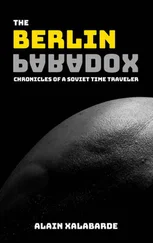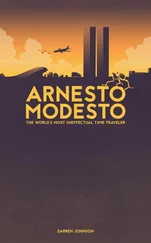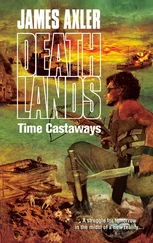James Gleick - Time Travel
Здесь есть возможность читать онлайн «James Gleick - Time Travel» — ознакомительный отрывок электронной книги совершенно бесплатно, а после прочтения отрывка купить полную версию. В некоторых случаях можно слушать аудио, скачать через торрент в формате fb2 и присутствует краткое содержание. Год выпуска: 2016, Издательство: Knopf Doubleday Publishing Group, Жанр: Старинная литература, на английском языке. Описание произведения, (предисловие) а так же отзывы посетителей доступны на портале библиотеки ЛибКат.
- Название:Time Travel
- Автор:
- Издательство:Knopf Doubleday Publishing Group
- Жанр:
- Год:2016
- ISBN:нет данных
- Рейтинг книги:5 / 5. Голосов: 1
-
Избранное:Добавить в избранное
- Отзывы:
-
Ваша оценка:
- 100
- 1
- 2
- 3
- 4
- 5
Time Travel: краткое содержание, описание и аннотация
Предлагаем к чтению аннотацию, описание, краткое содержание или предисловие (зависит от того, что написал сам автор книги «Time Travel»). Если вы не нашли необходимую информацию о книге — напишите в комментариях, мы постараемся отыскать её.
Time Travel — читать онлайн ознакомительный отрывок
Ниже представлен текст книги, разбитый по страницам. Система сохранения места последней прочитанной страницы, позволяет с удобством читать онлайн бесплатно книгу «Time Travel», без необходимости каждый раз заново искать на чём Вы остановились. Поставьте закладку, и сможете в любой момент перейти на страницу, на которой закончили чтение.
Интервал:
Закладка:
Other authorities offer entirely different constructions. Not one of them is wrong. What is time? “The general term for the experience of duration,” according to the Encyclopaedia Britannica (many editions). The very first English dictionary, Robert Cawdrey’s in 1604, avoided the problem and skipped right from thwite (“shave”) to timerous (“fearefull, abashed”). Samuel Johnson said “the measure of duration.” (And duration? “Continuance, length of time.”) A 1960 children’s book trimmed the definition to a single word: Time Is When. *2
The people who compose definitions for dictionaries try to avoid the circularity that comes when they use the very word they are defining. With time it’s unavoidable. The lexicographers of the OED throw up their hands. They divide “time” (only the noun, not the interjection *3or the obscure conjunction) into thirty-five distinct senses and almost a hundred subsenses, including: a point in time; an extent of time; a specific period of time; time available…; the amount of time taken up by something; and time viewed as a medium through which travel into the past or future is hypothesized or imagined to be possible. (“Cf. time travel. ”) They are covering all the bases. Perhaps their best effort is sense number ten: “The fundamental quantity of which periods or intervals of existence are conceived as consisting, and which is used to quantify their duration.” Even that definition merely postpones the circularity. Duration, period, and interval are defined in terms of time. The lexicographers know very well what time is, until they try to define it.
Like all words, time has boundaries, by which I don’t mean hard and impenetrable shells but porous edges. It maps weirdly between languages. A Londoner might say, “He did it fifty times, at the very least,” while in Paris, where the word for time is temps, fifty times is cinquante fois. Meanwhile, when the weather is good, the Parisian says, C’est beau temps. A New Yorker thinks the time and the weather are different things. *4And that is just the beginning. Many languages use a separate word to ask “What is the time?” as opposed to “What is time?”
In 1880 the United Kingdom enacted a legislative definition of time, the Statutes (Definition of Time) Act. This declared itself to be “an Act to remove doubts as to the meaning of Expressions relative to Time occurring in Acts of Parliament, deeds, and other legal instruments.” It was enacted “by the Queen’s most Excellent Majesty, by and with the advice and consent of the Lords Spiritual and Temporal [Time Lords!], and Commons.” If only these wise men and woman could have solved the problem by fiat. Removing doubts about the meaning of time is an ambitious goal. Alas, it turns out that they were not dealing with What is time? but only What is the time? The time in Great Britain, as defined by the act, is Greenwich mean time. *5
What is time? At the dawn of the written word, Plato struggled with the question. “A moving image of eternity,” he said. He could name the parts of time: “days and nights and months and years.” Moreover:
When we say that what has become is become and what becomes is becoming, and that what will become is about to become and that the nonexistent is nonexistent—all these are inaccurate modes of expression. But perhaps this whole subject will be more suitably discussed on some other occasion.
Here Aristotle, too, found himself in difficulties. “To start, then: the following considerations would make one suspect that it either does not exist at all or barely, and in an obscure way. One part of it has been and is not, while the other is going to be and is not yet.” The past has gone out of existence, the future has not yet been born, and time is made up of these “things which do not exist.” On the other hand, he said—looked at differently—time seems to be a consequence of change, or motion. It is “the measure” of change. Earlier and later, faster and slower —these are words that are “defined by” time. Fast is a lot of motion in a little time, slow is a little motion in a lot of time. As for time itself: “time is not defined by time.”
Later, Augustine, like Plato, contrasted time with eternity. Unlike Plato, he could hardly stop thinking about time. It obsessed him. His way of explaining was to say that he understood time very well, until the moment he tried to explain. Let us reverse Augustine’s process: stop trying to explain and instead take stock of what we know. Time is not defined by time—that needn’t paralyze us. When we leave aside the search for epigrams and definitions, it turns out we know a great deal. *6
—
WE KNOW THAT time is imperceptible. It is immaterial. We cannot see it, hear it, or touch it. If people say they perceive the passing of time, that’s just a figure of speech. They perceive something else—the clock ticking on the mantel, or their own heartbeat, or other manifestations of the many biological rhythms below the level of consciousness—but whatever time is, it lies outside the grasp of our senses. Robert Hooke made this very point to the Royal Society in 1682:
I would query by what Sense it is we come to be informed of Time; for all the Information we have from the senses are momentary, and only last during the Impressions made by the Object. There is therefore yet wanting a Sense to apprehend Time; for such a Notion we have. *7
Yet we experience time in a way that we do not experience space. Close your eyes, and space disappears: you may be anywhere; you may be big or small. Yet time continues. “I am listening not to Time itself but to the blood current coursing through my brain, and thence through the veins of the neck heartward, back to the seat of private throes which have no relation to Time,” says Nabokov. Cut off from the world, with no sensory perception, we may still count the time. Indeed, we habitually quantify time (“…and yet we conceive of it as a Quantity,” said Hooke). This leads to a plausible definition: Time is what clocks measure. But what is a clock? An instrument for the measurement of time. *8The snake swallows its tail again.
Once we conceive of time as a quantity, we can store it up, apparently. We save it, spend it, accumulate it, and bank it. We do all this quite obsessively nowadays, but the notion is at least four hundred years old. Francis Bacon, 1612: “To choose Time, is to save Time.” The corollary of saving time is wasting it. Bacon again: “Prolix and florid Harangues…and other personal Speeches are great Wasters of Time.” No one would have begun thinking about time as a bankable commodity who was not already familiar with money. Time hath, my lord, a wallet at his back, / Wherein he puts alms for oblivion. But is time really a commodity? Or is this just another shabby analogy, along with time the river?
We go back and forth between being time’s master and its victim. Time is ours to use, and then we are at its mercy. I wasted time, and now doth time waste me, says Richard II; For now hath time made me his numbering clock. If you say that an activity wastes time, implying a substance in finite supply, and then you say that it fills time, implying a sort of container, have you contradicted yourself? Are you confused? Are you committing a failure of logic? None of those. On the contrary, you are a clever creature, when it comes to time, and you can keep more than one idea in your head. Language is imperfect; poetry, perfectly imperfect. We can occupy the time and pass the time in the same breath. We can devour time or languish in its slow-chapp’d power.
Читать дальшеИнтервал:
Закладка:
Похожие книги на «Time Travel»
Представляем Вашему вниманию похожие книги на «Time Travel» списком для выбора. Мы отобрали схожую по названию и смыслу литературу в надежде предоставить читателям больше вариантов отыскать новые, интересные, ещё непрочитанные произведения.
Обсуждение, отзывы о книге «Time Travel» и просто собственные мнения читателей. Оставьте ваши комментарии, напишите, что Вы думаете о произведении, его смысле или главных героях. Укажите что конкретно понравилось, а что нет, и почему Вы так считаете.












